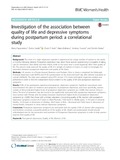| dc.description.abstract | Background: The onset of a major depressive episode is experienced by a large number of women in the weeks
or months following delivery. Postpartum depression may deem those women experiencing it incapable of taking
care for themselves, their family and their infants, while at the same time it could negatively affect their quality of
life. The present study assessed the quality of life of a sample of mothers in Greece, in order to investigate the
association between postpartum depression and quality of life (QoL).
Methods: 145 women in a Private-General Obstetrics and Pediatric Clinic in Greece completed the Edinburgh
Postnatal Depression scale (EPDS) and SF-36 questionnaire on the third and fourth day after delivery (caesarean or
normal childbirth). The data were analyzed using SPSS version 17.0. Linear and logistic regression analysis was
performed in order to find the independent factors related to the quality of life and postpartum depression
symptoms.
Results: 9.9% of the participants experienced postpartum depression symptoms. Significant associations were
found between the place of residence and symptoms of postpartum depression, and more specifically, women
outside of Attica indicated higher levels of postpartum depression symptoms (p = 0.008) than women living in
Attica. The level of education was also found to be significantly associated with postpartum depression symptoms,
since women with Primary and Secondary education experienced higher levels of postpartum depression
symptoms (p = 0.005) than those with a tertiary education. Concerning quality of life, women with postpartum
depression symptoms scored 24.27 lower in «Role-Physical», 15.60 lower in «Bodily pain», 11.45 lower in «General
Health», 14.18 lower in dimension of «Vitality», 38.25 lower in Role – Emotional and 16.82 lower in dimension of
mental health, compared to those without depression symptoms.
Conclusion: Postpartum depression symptoms are associated with the quality of life of women after pregnancy,
and therefore constitute a powerful predictor of the quality of life. Health care professionals should provide
individualized care for the prevention and treatment of Postpartum Depression symptoms in order to help women
improve their quality of life. | en_UK |


